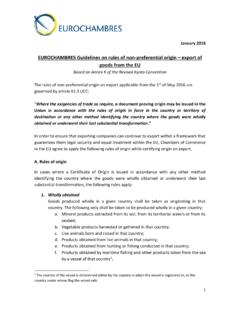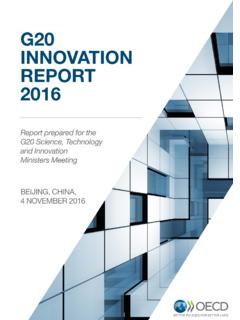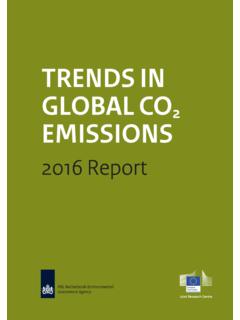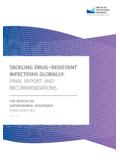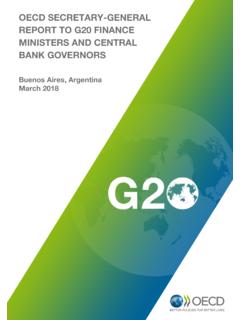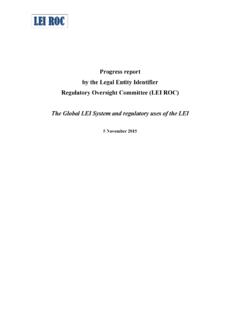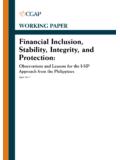Transcription of GLOBAL ECONOMIC REPORT 2017 - EUROCHAMBRES
1 1 Regional Coverage of the GLOBAL Chamber Platform (GCP) Draft REPORT by EUROCHAMBRES with the cooperation of the GLOBAL Chamber Platform October 2016 GLOBAL ECONOMIC REPORT 2017 2 The GLOBAL ECONOMIC Survey 2017 was conducted during the months of August and September 2016 among Members of the GLOBAL Chamber Platform. The REPORT was reviewed and adopted during the annual GCP gathering on 13 October 2016 in Brussels. The Survey intends to gather a qualitative assessment from GCP Members on GLOBAL ECONOMIC developments, trade policy and other key policy challenges. Thus, conclusions drawn from the answers reflect the majority opinion of GCP Members, without prejudice to diverging opinions of single Members, which are sought to be highlighted in the REPORT were appropriate. The GLOBAL Chamber Platform (GCP) brings together the 16 major national and trans-national Chamber organisations from the four corners of the globe.
2 Its key objective is to facilitate trade and market access internationally as well as developing coherent and innovative answers to the challenges of globalisation and that the shift in GLOBAL ECONOMIC realities brings about for all players involved. The Members that responded to the 2017 GLOBAL ECONOMIC Survey were: Associaci n Industrial Latino-Americana (AILA) China Council for the Promotion of International Trade (CCPIT) Iran Chamber of Commerce, Industry and Mines (ICCIM) Association of European Chambers of Commerce and Industry ( EUROCHAMBRES ) Chamber of Commerce and Industry of the Russian Federation (TPPRF) Federation of Indian Chambers of Commerce and Industry (FICCI) Federation of Chambers of the Gulf Cooperation Council (FGCCC) Ibero-American Association of Chambers of Commerce (AICO) Confederation of Asia-Pacific Chambers of Commerce and Industry (CACCI) Additionally, contributions were made from: Union of Chambers and Commodity Exchanges of Turkey (TOBB) Organisation des Entreprises Africaines (OEA) For its responses, EUROCHAMBRES could count on the following contributions from its Members.
3 Luxembourg Chamber of Commerce Federation of Belgian Chambers of Commerce Italian Chamber of Commerce (Unioncamere) Malta Chamber of commerce German Chamber of Commerce (DIHK) Austrian Federal ECONOMIC Chamber (WK ) 3 Executive Summary: I. GLOBAL Growth and Business Confidence: Slight optimism in terms of growth expectations by GCP Members for the remaining months of 2016 when compared to the World Bank ECONOMIC outlook from June. While largely confirming the World Bank outlook, some world regions send an encouraging signal for 2016 by expecting either more positive GDP growth or a less than expected contraction, according to the GCP. This is particularly true according to GCP members form Russia, and Latin America and the Caribbean. A consistent outlook is expected for Europe, China, the East Asia and the Pacific and a less optimistic outlook only expected for Turkey and the Gulf region in the eyes of the GCP.
4 For 2017 business confidence is set to increase or remain stable for most of the GLOBAL economy according to the GCP, confirming the hopeful signals expected for GDP forecasts in 2016 . The result points to a likely consolidation of the business climate in the respective regions in the upcoming year. While there is an overall positive trend, GCP representatives from China, Turkey and Europe see levels of business confidence to remain constant for the upcoming year, while only CACCI points to a less favourable business climate. Political and social insecurity and the health of the financial sector are seen by far as the major threats for the GLOBAL economy for 2017 , with political and social insecurity topping the list for the third consecutive year as the main challenge for the GLOBAL economy. Compared to last year, the health of the financial sector has moved back as key challenge ranking second, while fiscal crises in major markets dropped to third place down from being the second last year.
5 Fears regarding protectionism and a lack of adequate access to foreign markets has surfaced this year as a main challenge by equally ranking third, together with perceived risks of inflation and deflation. II. Migration: Migration has become a key topic in the GLOBAL agenda, and was included for the first time in the ECONOMIC survey this year. To gauge better the impact of migration on business and society at large, GCP were asked to give their perceptions, and their response was very mixed. While GCP Members, from Europe, Central Asia, Iran, and Turkey saw migrants primarily as an ECONOMIC opportunity, others GCP members including those from China, Russia, Latin America or the Gulf region believe that the long term challenges associated with migration will outweigh the ECONOMIC benefits. Accordingly no clear GLOBAL message emerges on the issue of migration according to the GCP. III. Competitiveness: For the second consecutive time, attracting investment through a business friendly environment has been ranked as the single most important policy to ensure the competitiveness of businesses.
6 The second most important policy is the qualification of 4 the workforce, which over the years has become an ever more important issue for its businesses according to the GCP. IV. Financial Services: Despite many efforts undertaken by policy makers and financial regulators, the general perception among GCP members is that none of it was enough to sufficiently stabilize the financial system with an ultimate goal of preventing further crises. The signals coming from different corners of the world such as Latin America, India, China, Russia or the Gulf reflect the need for more efficient and concerted action to prevent further imbalances and fragmentation of the world financial system To restore confidence and avoid future financial crises, the GCP have last year clearly prioritized international solutions, namely promoting international convergence of common standards in the regulatory and supervisory area. This year, the GCP were asked what exact fields of actions should be prioritized by policy makers to improve GLOBAL coordination of financial market regulation.
7 In this regard, the GCP members believe there is a need for core principles for effective banking supervision, a single set of prudential rules, and lastly a better cooperation on the international level in field of cybersecurity, data and technology principles. The need for the latter is especially felt in Latin America and Europe, with banking supervision and prudential rules are being on top of the lists for GCP members in China , East Asian and Pacific as well as Iran. V. Climate Change: The Paris Agreement adopted at COP21 last year reflects the collective vision of 195 countries on how to limit the increase of GLOBAL warming, laying out essential goals on how this is to be achieved. Yet each party remains free to decide how to achieve their intended national contributions. GCP members were thus asked to rank the measures they most favour for their respective governments to implement. In this context according to the GCP, investment programmes for sustainability and renewable energy are the most important instruments to boost the GLOBAL transformation to a low carbon economy, sending a clear signal to GLOBAL leaders that developing further funding and financing schemes are vital to exploit the GLOBAL potential of renewables.
8 High scores have also been attached to strengthened energy-efficiency performance standards, mainly advocated by countries deposing of high potentials in this regard, including China, India, Iran and Russia, while being less popular in Europe and Latin America. Moreover, several GCP members call for more public support for low carbon innovation, including those from Europe, China and India. VI. Trade and Investment: With trade policy coming under increasing pressure in the developed world, GCP Members were asked to assess whether trade has delivered for them, and the vast majority responded affirmatively, as they see concrete benefits from trade and investment for the companies in their respective regions. At the same time they opted for a more active engagement by their respective governments in bilateral, plurilateral, and multilateral trade negotiations as it is seen as the most effective solution to reduce trade restrictiveness on a GLOBAL scale and gain access to international growth centres.
9 5 At the level of the G20 pledges to reduce trade restrictiveness across the GLOBAL economy, the vast majority of GCP Members are disappointed with the results achieved, considering that G20 members have underperformed in this area. At the multilateral stage and more precisely for the post Doha Agenda at the WTO, GCP Members have ranked as their top three priorities, digital trade and e-commerce, small and medium sized enterprises (SMEs) and investment. In particular with regards to an SME initiative at the WTO, special and differential treatment for SMEs, flexibility in government procurement and a regulatory agenda tailored to small business are key issues to be addressed in the eyes of the GCP. Worryingly, internal quarrels on competence within the EU, between Member States and the European Commission on external trade are already having repercussions across different world regions with respect to their confidence in the EU s ability to effectively conclude trade deals with its partners in the future.
10 GCP members form India, the Gulf region as well as Turkey see their regions confidence diminished, while EUROCHAMBRES own members are split on this issue. VII. Focus on Europe: The referendum on the so-called Brexit has clearly influenced the GLOBAL agenda this year. Accordingly the GCP were asked to assess whether they believe this has had an influence on their regions confidence to continue investing in Europe. The answers mostly point to overall confidence remaining unaffected, yet for some GCP members from regions which are large investors, such as China, Latin America and Turkey, an effect on their confidence has been noticed. 6 I. Macroeconomic outlook of the GLOBAL economy 1) Expectations for real Gross Domestic Product (GDP) growth in their respective regions for 2017 , compared to the World Bank s forecast. Overall Analysis: This year s GLOBAL ECONOMIC Survey offers a slight upward trend in terms of growth expectations by GCP Members for the remaining months of 2016 when compared to the World Bank ECONOMIC outlook form June.
